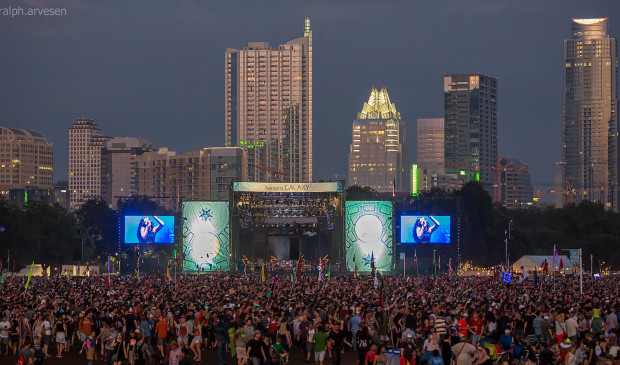Special events ordinance re-emerges
Friday, October 23, 2015 by
Margaret Nicklas With ACL in the rearview mirror, the Trail of Lights just ahead and the city’s South by Southwest Music Festival already on the horizon, Austinites may be wondering what has happened to the special events ordinance that was supposed to improve how such events are handled by the city. The draft set of rules and policies was the result of a 2012 resolution and was last considered by City Council in 2013. In October 2014, as reported by the Austin Monitor, the city’s Public Safety Commission declined to vote for or against the item, saying it did not fall within its purview. In the year since then, the draft ordinance has remained more or less out of the public eye. But it may now be getting a push forward, along with some new scrutiny, from the city’s recently formed Parkland Events Task Force.
The task force is charged with developing recommendations “to ensure that all City parks, but most particularly Auditorium Shores, Zilker Park, and Festival Beach, remain first and foremost assets for the citizens of Austin to enjoy and that the parks are preserved and enhanced for future generations of Austinites and visitors to experience and enjoy.”
On Tuesday, task force members met for the fifth time since the new Council created the group in March. Some members seemed surprised, even concerned, to learn about the draft ordinance during a presentation from Bill Manno, corporate special events program manager with the Austin Center for Events, a city office that works with other city departments to facilitate event permitting. After he “walked through” the 28-page document, choosing a few sections to explain or highlight, Manno advised the group to give its input “sooner rather than later,” saying he had hopes of getting the draft back to Council as early as the year’s end. The ordinance is not a “cure-all,” he said, and it’s not going to make everyone happy. Nevertheless, it’s important to get certain things in place, he said, citing a need to consolidate the requirements, such as application deadlines and fee schedules, in one place.
“The main goal of all of this is to provide better customer service from the city to the residents, to the event organizers,” Manno told the Monitor. And although the city continues to try to improve service even without an approved ordinance, the measure would formalize the process and the authority to do certain things, as well as penalties if people don’t do certain things. The ordinance creates a sense of “scalability,” he added, so that events of different sizes are not all treated the same way. The ordinance has not been sent back to Council yet, in part because it is still under review by the City Attorney’s Office, Manno said.
Spending more than half of their two-hour meeting on the draft ordinance, task force members disagreed on how to tackle their review of the document and on the extent to which it relates to the group’s core mission. Co-chair David King, the District 5 appointee who represents neighborhoods often affected by events at Zilker Park and Auditorium Shores, insisted that there is a significant connection between the draft ordinance and the task force’s charge and underscored the importance of members gaining an understanding of what it contains. Some members favored forming a subcommittee to work on the ordinance. Others wanted a post-meeting chance to study the document before weighing in on the kind of resources the group should officially devote.
If passed by Council in its current form, the draft special events ordinance would address key issues related to how parks and other venues are used to host large- and medium-sized events and would give the city a new framework – a tier system – for categorizing and managing events.
But as noted by Carol Lee, appointed to represent District 10, the definitions for the four tiers lack some specificity, and criteria vary across categories, which may be confusing. For instance, Tier 1 events are defined as events that do not include alcohol consumption (along with other characteristics), but alcohol consumption is not a factor in Tiers 2, 3 and 4. The number of attendees (under 2,500) may define a Tier 2 event, while estimated city-related costs of $100,000 or more may define a Tier 4 event. A Tier 3 event is defined simply as “one that is not covered by Tiers 1, 2 and 4.”
The members agreed to review the document on their own and to come back to the next meeting, set for Nov. 3, with more questions.
Task force members also took a look at efforts thus far to get community input, important because it will help shape the recommendations they will make to Council related to all their various charges. The group has completed one survey based on text messages and will continue to receive comments through SpeakUpAustin.org. Members explored the possibility of using other forums to gather perspectives from both residential and business sources. A public hearing – originally planned for November – was deferred.
The task force began meeting in late August, once most appointments were finalized. Seventeen members have been named to the group – one for each Council member and the mayor, along with three appointees from Council’s Open Space, Environment and Sustainability Committee and one representative each from the Environmental Board, the Parks and Recreation Board and the Austin Music Commission. Meeting agendas, minutes and other information considered by the group can be found online here.
Photo by Ralph Arvesen made available through a Creative Commons license.
You're a community leader
And we’re honored you look to us for serious, in-depth news. You know a strong community needs local and dedicated watchdog reporting. We’re here for you and that won’t change. Now will you take the powerful next step and support our nonprofit news organization?









